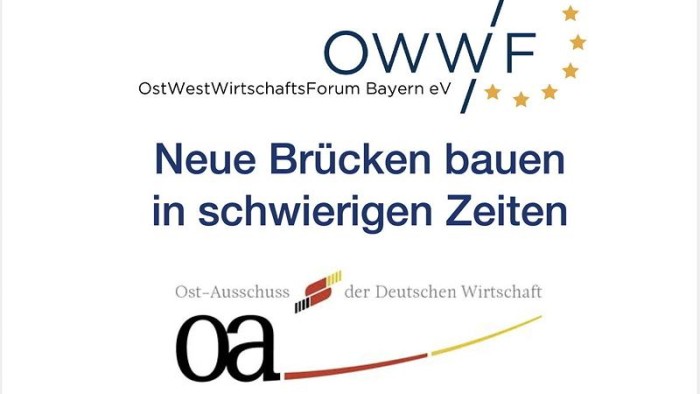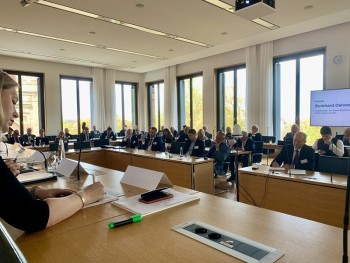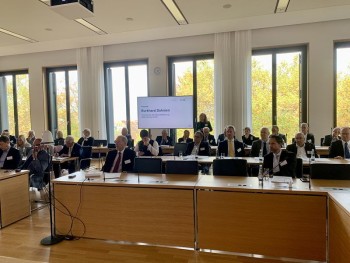
The focus of the event was the "Opportunity Area Eastern Europe and Central Asia".
The Russian war of aggression in Ukraine has turned the world order upside down. The European Union's sanctions against Russia are also having a drastic effect on the EU economy: rising energy prices, disrupted supply chains and planning uncertainties are causing distress for many companies.
What is the current situation? What solutions could there be, what conclusions can be drawn from the past months and what opportunities do the states in Eastern Europe and Central Asia offer now that Russia and Belarus have dropped out as economic partners.
In his welcome address, President Eberhard Sinner emphasised that the goal cannot be to stop globalisation. The process of ever-increasing international networking has led to a great rise in living standards and an era of prosperity in many countries. However, this increasing interconnectedness and the associated outsourcing of individual economic production segments to other countries, as well as increasingly complex and international supply chains, also offer increasing vulnerabilities to disruption.
Even small events can cause major disruptions. Take, for example, the accident of the "Ever Given" in March 2021, when the supply chains were permanently disrupted by the blockade of the Suez Canal that lasted for days.
In today's world, it can no longer be just about the most efficient or cheapest output possible. Reliability and diversification must become increasingly important, says Sinner. For this, it is also necessary to talk about reducing dependencies.
In his keynote speech, Burkhard Dahmen emphasised that the Eastern European area is an area of opportunities. With the countries that the Committee on Eastern European Economic Relations looks after, there was a trade volume of 461 billion euros in 2019 alone. In addition to the high trade volume and the growing export figures, the Eastern European region is posting particularly high growth. Dahmen pointed out that a huge economic area is opening up here for Germany, which offers great potential and could ease many problems, especially in the areas of renewable energy.
The international supply chains in particular are under a great deal of tension and have shown themselves to be very susceptible to disruptions in recent years. Dr. Helena Melnikov, as General Manager of the German Association of Materials Management, Purchasing and Logistics (BME), reported on the current challenges and emphasised that purchasing in particular is generally becoming more and more "multidimensional". Whereas a few years ago the focus was on the lowest possible purchase price, today it is of much greater value to many companies not to have to wait two months for a delivery, to be less dependent on changing international political landscapes and thus to have more planning security. The BME supports the transformation of logistics and materials management. "Transformation only succeeds together," said Melnikov.
Lecture Dr. Helena Melnikov BME + Presentation (German)
Jens Böhlmann then told the participants about his experiences from the Eastern European and Central Asian region. He showed the importance of individual states and groups of states. The trade volume with Eastern Europe is larger than with China and the USA together. The Visegrád states alone (Poland, the Czech Republic, Hungary and Slovakia) are responsible for about ²/₃ of the above-mentioned trade volume of almost 500 billion Euros, with Poland even ranking fifth among Germany's trading partners. The industrial infrastructure in Poland offers optimal conditions for production and logistics locations. Economic partnerships are developing well with all Eastern European countries, although there are always "democratic deficits" that need to be worked on within these relationships.
Likewise, the Central Asian region is also of high importance for the near and medium-term future. Böhlmann clearly stated that Central Asian countries such as Kyrgyzstan, Turkmenistan, Kazakhstan, Uzbekistan and Tajikistan have strategic relevance when it comes to long-term relations with China. These nations have recognised that the People's Republic of China operates, in a sense, with a three-step model. It invades a foreign market, monopolises it and then dictates the rules, says Böhlmann. Since the Central Asian countries have already recognised this fact - the same applies to Africa, by the way - resistance is developing in these countries against the intrusion of Chinese forces into their own market. In addition, in the case of Uzbekistan, for example, there is a large surplus of skilled workers and labour. The OA is working here on a possible transfer of skilled workers to Germany.
The opportunities that will arise after the end of the war in Ukraine should not be underestimated. At various donor conferences, several hundred million euros have already been pledged for the reconstruction of the country, Böhlmann said.
In the subsequent panel moderated by Jens Böhlmann, the participants presented the current situation of their companies.
Mikhail Volkov (STEGO) focused primarily on the problem of a lack of raw materials, which are essential for a manufacturing company.
Dirk Dörrschuck (Rhode&Schwarz) made it clear that it can now make sense for a company to no longer think "just-in-time", but to invest funds in stocks in order to build up resilience against a suddenly changing global situation and thus secure its own ability to deliver.
Markus Reigl (SIEMENS AG) reported on changing demands on the purchasing departments of every company. It is about proactive risk management. He also spoke out strongly in favour of EU enlargement: "From an economic point of view, the admission of the Western Balkan states is definitely to be advocated".
According to Dr. Helena Melnikov, the "local-for-local" concept is becoming more and more popular in Europe, as its own domestic market is less susceptible to fluctuations and there are significantly shorter supply routes. Supply chain problems and corona policies in China have caused a rethink in globalisation strategy. Instead of "who does it cheaper", it is "who does it better." Eastern Europe and especially the Visegrád states offer the right conditions for this intracontinental concept.
President Eberhard Sinner summed up the afternoon at the end. Globalisation and division of labour is a win-win situation for all in normal times. However, supply chains and global trade relations are vulnerable to disruption:
• Pandemic
• Wars Russia Ukraine, China Taiwan
• Terrorist attacks on infrastructure pipelines, power plants, etc.
• Cyberwar against digitalisation vulnerabilities
• Interconnections in infrastructure with blackmail potential, example port of Hamburg
• Sanctions and reactions
Globalisation needs rules of the game WTO
Globalisation needs multilateralism in preventing disruptions
Globalisation needs reliability of partners
Globalisation needs diversification and thus risk spreading
Globalisation must mean "as close as possible and as far as necessary."
The EU internal market offers many opportunities to become more capable of acting in globalisation. Examples include pandemics, the European Chips Act, trans-European networks, and the need to create a "Schengen area" for energy.
We look to Eastern Europe and Central Asia. "Global Gateway" is the EU's answer to the "New Silk Road". Today's conference should raise awareness and point the way to "new bridges".
President Sinner concluded by thanking the Vice-President of the Bavarian Parliament, Karl Freller, who had worked vehemently to ensure that the event could once again take place in the Maximilianeum. He thanked all the speakers, the Committee on Eastern European Economic Relations with its Chairman of the Board Michael Harms at the helm. A final thank you goes to the organisers of the event, Jens Böhlmann (OA), Hermann Pönisch and. Bernd Pantze (both OWWF).


